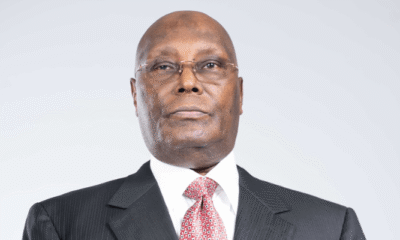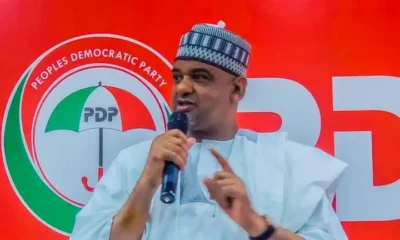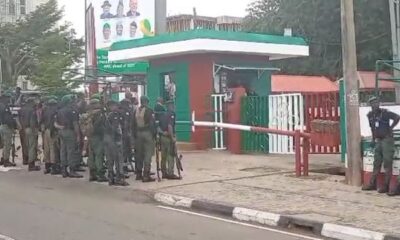Uncategorized
PDP Woes Beyond Atiku, Due To Ego, Says Lawal
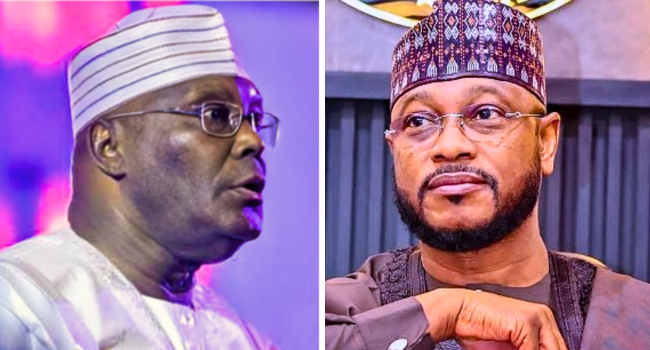
The PDP has been enmeshed in a crisis which has seen a wave of defections to the All Progressives Congress (APC).
Zamfara State Governor, Dauda Lawal, has said that the crisis rocking the Peoples Democratic Party (PDP) goes far beyond its 2023 presidential candidate, Atiku Abubakar, and is largely rooted in ego battles among party members.
Governor Lawal, who spoke during a media parley with journalists on Wednesday in Zamfara, stated that the problem is not limited to any single individual.
“Everybody has their own issue; it’s not just about Atiku Abubakar; it’s beyond him,” he said.
“It’s an internal problem within the PDP, and we are making a conscious effort. I think it’s about people’s egos — everybody, no exception.”
When asked if he included himself among those contributing to the ego-driven conflict, Lawal responded, “Yes.”
Speaking further on Nigeria’s electoral process, Governor Lawal expressed optimism that free and fair elections remain possible despite systemic challenges.
He cited that his candidacy as the first PDP governor in the state is proof of electoral fairness as the 2027 elections gain weight.
“I will say yes, because I experienced it in Zamfara State — with all the powerful people that can turn things around, with the might of the Federal Government and everything,” he said.
“Yes, there will still be a free and fair election. That was what made me elected as the governor of Zamfara State. I was the first elected PDP governor in Zamfara State. So, it was a free and fair election, and I believe it will happen. It’s a matter of time.”
Internal Wranglings
The PDP has been enmeshed in a deepening crisis following its loss in the 2023 elections, sparking a wave of defections to the ruling All Progressives Congress (APC), particularly among members of the National Assembly and governors.
Notable among the recent defections is Akwa Ibom Governor Umo Eno. Similarly, Delta State Governor Sheriff Oborevwori, his deputy, Monday Onyeme, and former Governor Ifeanyi Okowa, commissioners, and others also joined the APC in April.
In response, the PDP’s National Working Committee held an emergency meeting in Abuja to confront growing disunity and internal tension.
Amid the chaos, former Vice President Atiku Abubakar — who has contested for the presidency six times — has begun consulting political heavyweights such as Peter Obi and Nasir El-Rufai, seeking to form a formidable opposition coalition ahead of 2027.
He described the mission as a response to what he sees as the threat of a creeping “one-party state” under the APC.
However, not all within the PDP back the coalition plan. Party stalwart, Bode George, remains optimistic about internal reconciliation, as the party prepares for its 100th National Executive Committee (NEC) meeting.
But further complications emerged after the Independent National Electoral Commission (INEC) rejected the PDP’s NEC notice for procedural reasons.
In a 13 June 2025 letter, INEC cited non-compliance with guidelines requiring that meeting notices be jointly signed by both the National Chairman and Secretary.
The letter noted that only Acting Chairman Umar Damagum signed the notice, omitting National Secretary Samuel Anyanwu.
The NEC, slated for 30 June, is expected to address leadership disputes and zonal matters. Meanwhile, the G5 group, led by FCT Minister Nyesom Wike, has renewed calls for zoning the 2027 presidential ticket to the South.
Channelstv.com
Uncategorized
Abuja Polls: Tension At Collation Centre As Party Agents Reject Results, Clash With INEC

There was a tense tension at a ward collation centre in Garki, Abuja, following a dispute between party agents and officials of the Independent National Electoral Commission over the handling of councillorship election results. The disagreement started during the collation of votes for the councillorship contest. Party agents accused electoral officials of blocking access to the result sheets before announcing the final figures.
Witnesses at the centre said party representatives were earlier allowed to cross-check figures for the chairmanship election. This process was reportedly carried out calmly and in line with procedure. However, the atmosphere changed when officials moved to declare councillorship results without permitting agents to verify the numbers with their own records.
The move triggered loud protests and heated exchanges inside the collation hall. Several agents insisted that the same level of transparency given during the chairmanship collation should apply to the councillorship exercise. One aggrieved party agent openly challenged the officials and demanded that the figures be reviewed before any declaration was made.
“Sir, we disagree with this final figures. Let’s confirm them with our record. You were there when during the chairmanship, they brought the figures, we checked, so can’t they allow us to do the same for councillorship? They just declare it like that without us checking the figures?” the agent said.
He added, “We disagree with these figures, let’s check them. Who does that? Let’s see it.”
The confrontation briefly disrupted the collation process and caused confusion among voters and party supporters present at the centre. The incident is one of several disputes recorded during the Federal Capital Territory Area Council elections, which have been marked by complaints of procedural lapses, delays and low voter turnout in some wards.
Meanwhile, early results released from the chairmanship elections show that the All Progressives Congress has taken the lead in key councils. The party has so far secured victories in Abuja Municipal Area Council (AMAC), Bwari Area Council and Kwali Area Council. Two other chairmanship results are still being awaited.
The Peoples Democratic Party won the Gwagwalada Area Council seat.
In AMAC, APC candidate Christopher Maikalangu polled 40,295 votes to defeat his closest challenger from the African Democratic Congress, who scored 12,109 votes. The PDP candidate recorded 3,398 votes. Maikalangu is the incumbent chairman.
In Bwari Area Council, APC’s Joshua Ishaku emerged winner with 18,466 votes. The ADC candidate came second with 4,254 votes, while the Zenith Labour Party candidate secured 3,515 votes.
Uncategorized
Germany To Deliver 5 More Missiles Interceptors To UKraine
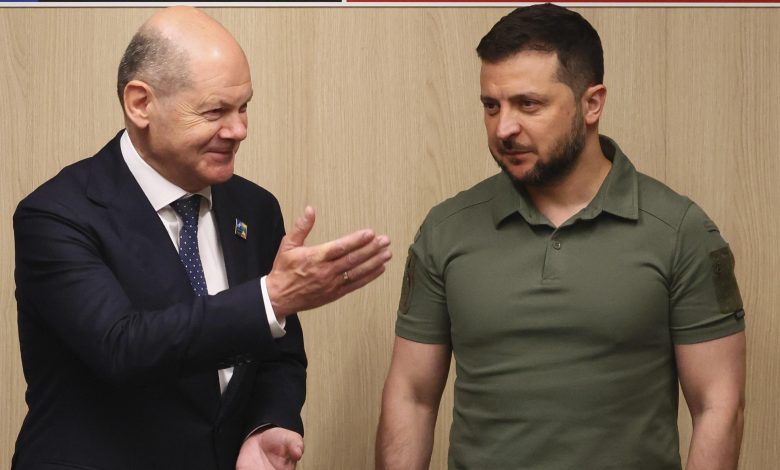
Germany will deliver five additional PAC-3 missile interceptors to Ukraine if other countries donate a total of 30, German defence minister Boris Pistorius said on Thursday.
PAC-3, or Patriot Advanced Capability-3, is among the main weapons the West has supplied to Ukraine as it fights Russia’s invasion.
“We all know it is about saving lives,” Pistorius said in Brussels after a meeting of the Ukraine Defence Contact Group.
“It’s a matter of days and not a matter of weeks or months,” he added.
The minister noted that the Patriots announcement has not yet been approved by national governments, but said he is “very optimistic” that the 30+5 target can be achieved.
Uncategorized
Impersonation: Army Arrests Man Posing As Military General
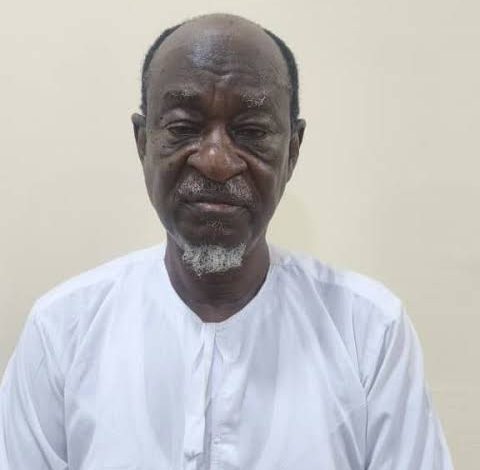
The Nigerian Army on Thursday said it has arrested Alhaji Tijjani Abdul Rauf, a man posing as a military general, misleading the public and abusing the prestige of the military institution.
In a statement issued by Appolonia Anene, the Army said it uncovered and arrested Rauf who parades himself as a retired Major General after he consistently exploited false credentials to intimidate unsuspecting civilians,
Anene said investigations showed that contrary to his claims, the imposter was never commissioned into the Nigerian Army, nor did he attain the rank of a general from the service.
She stated that further investigations revealed that Tijjani also fraudulently claimed attendance at the prestigious National Institute for Policy and Strategic Studies (NIPSS), Kuru, while asserting that he was a recipient of the national honour, Officer of the Order of the Federal Republic (OFR).
“The impostor was found to have consistently exploited these false credentials to intimidate unsuspecting civilians, including during court proceedings where he presented himself as a retired senior military officer to command undue respect, sympathy and influence.
“During interrogation, media reports published in two nationally recognised newspapers were recovered, in which the impostor was repeatedly referred to as a “retired Major General.” These misrepresentations, now established to be false, further demonstrate the extent to which the individual sustained his deception within the public space,” Anene said.
Continuing, she highlighted that one such claim, published by an online newspaper, was the identification of Tijjani as “Major General AbdulRauf Tijjani (rtd)” in a suit instituted against the Lagos State Government and other respondents, in which he sought ₦8 billion in damages.
In another report, the imposter was also referred to as a Major General while detailing his appeal against the dismissal of the same suit, which the court had earlier described as a gross abuse of court process and incompetent in law.
“The Nigerian Army wishes to categorically state that no retired officer of the Nigerian Army bears the name Alhaji Tijjani Abdul Rauf, nor has any officer with such identity ever held the rank of Major General or above within the Service. We strongly condemn this act of impersonation, which constitutes a grave offence, undermines public trust and tarnishes the honour and integrity of officers who have genuinely served the nation with distinction.
“The Nigerian Army reiterates its commitment to protecting the sanctity of its ranks, honours and institutions and will continue to collaborate with relevant authorities to ensure that impostors and fraudsters are brought to justice. Members of the public are hereby urged to verify claims of military status through appropriate channels and report any suspicious representations to security agencies,” she added.
She further called on the general public to be mindful of the dangers associated with the impersonation or use of military uniforms and badges by unauthorised persons as the Army will not hesitate to apprehend and prosecute such persons in accordance with the law.
-

 Politics2 days ago
Politics2 days agoAssembly Confirms Popular Redeemed Pastor As Deputy Governor
-

 Foreign2 days ago
Foreign2 days agoCabinet Reshuffle: President Sacks Finance Minister
-

 Business2 days ago
Business2 days agoJUST IN: 13 Banks May Shut Down In March As CBN Confirms 20 Safe For Recapitalisation Deadline
-

 Politics7 hours ago
Politics7 hours agoBREAKING: “Serial Disrespect” Sparks Drama As Senate Order Arrest Of Tinubu’s Appointee
-

 Politics7 hours ago
Politics7 hours agoOpposition Leaders Urge N’Assembly To Begin Fresh Electoral Act Amendment
-

 Opinion7 hours ago
Opinion7 hours agoEdo State To Spend N1billion On Armoured Car For Speaker, N4.6billion On Vehicles For Lawmakers

